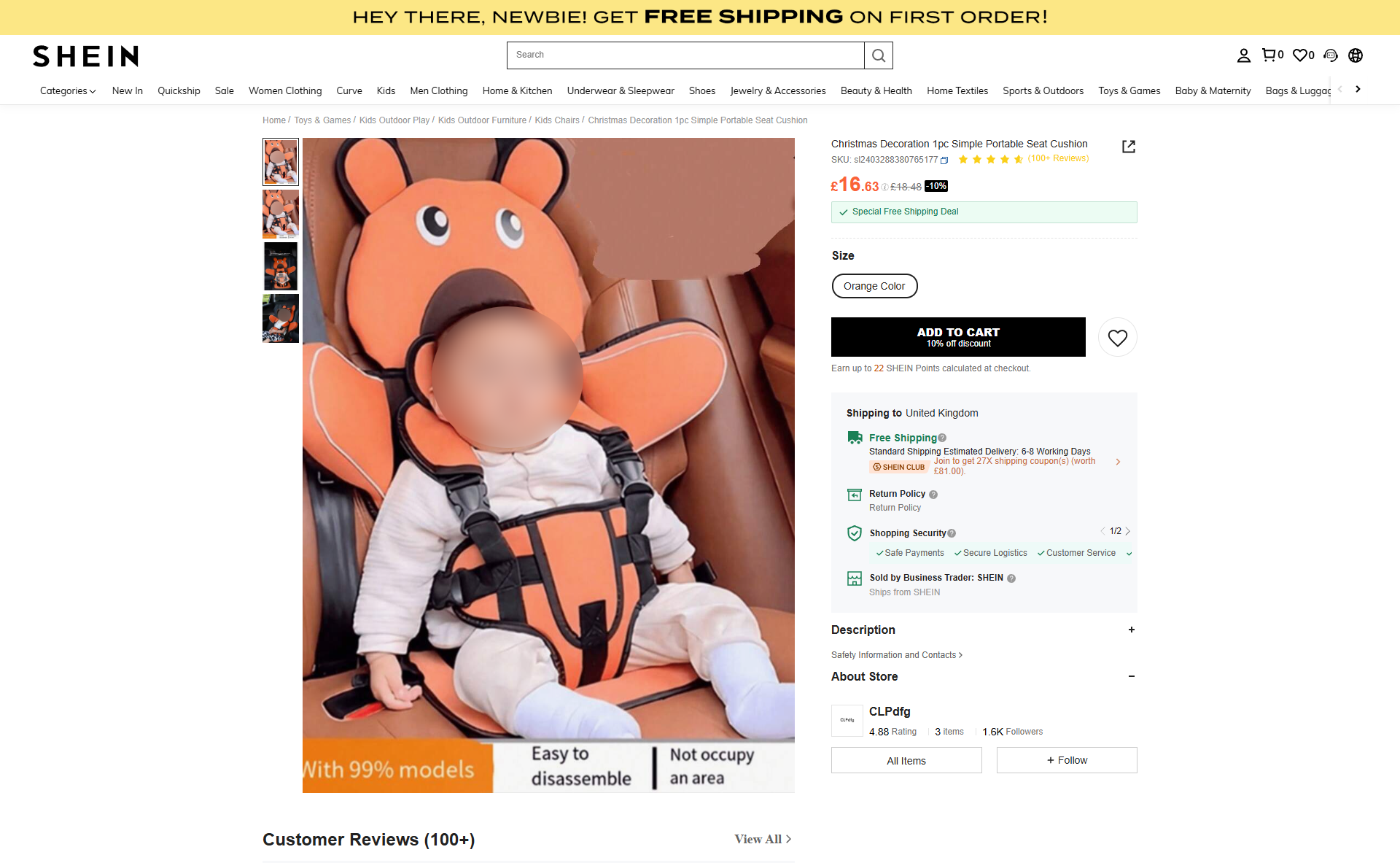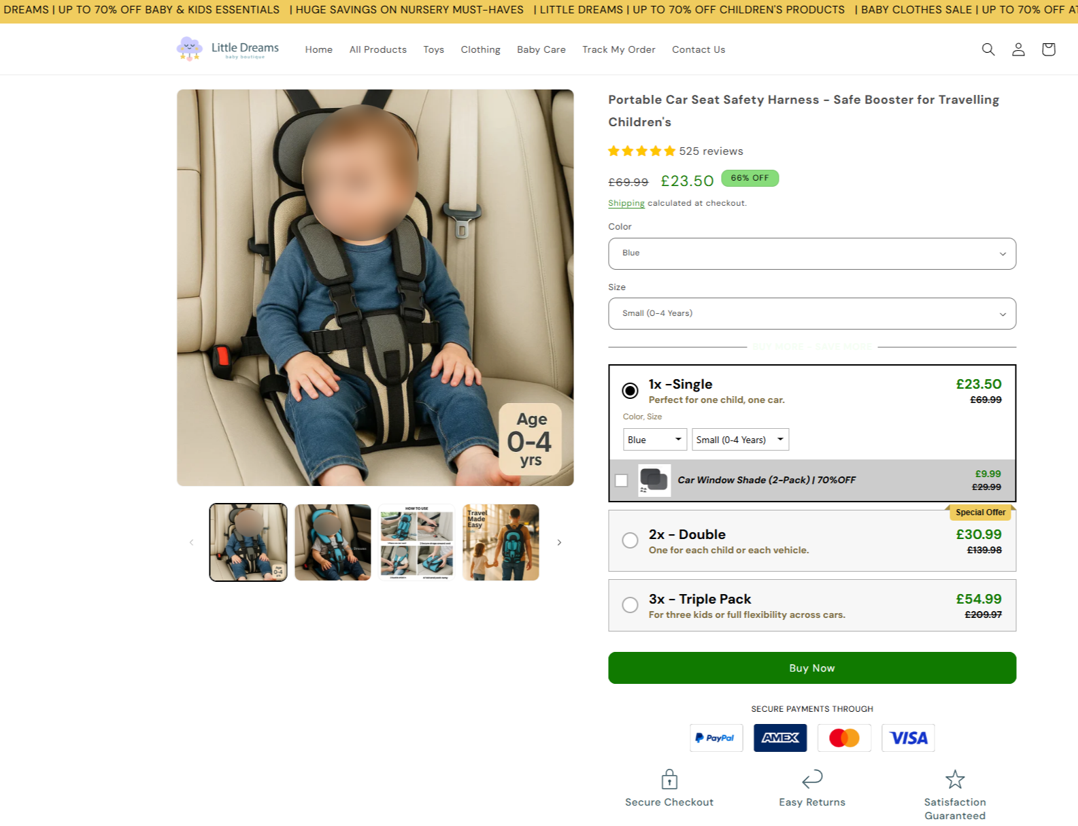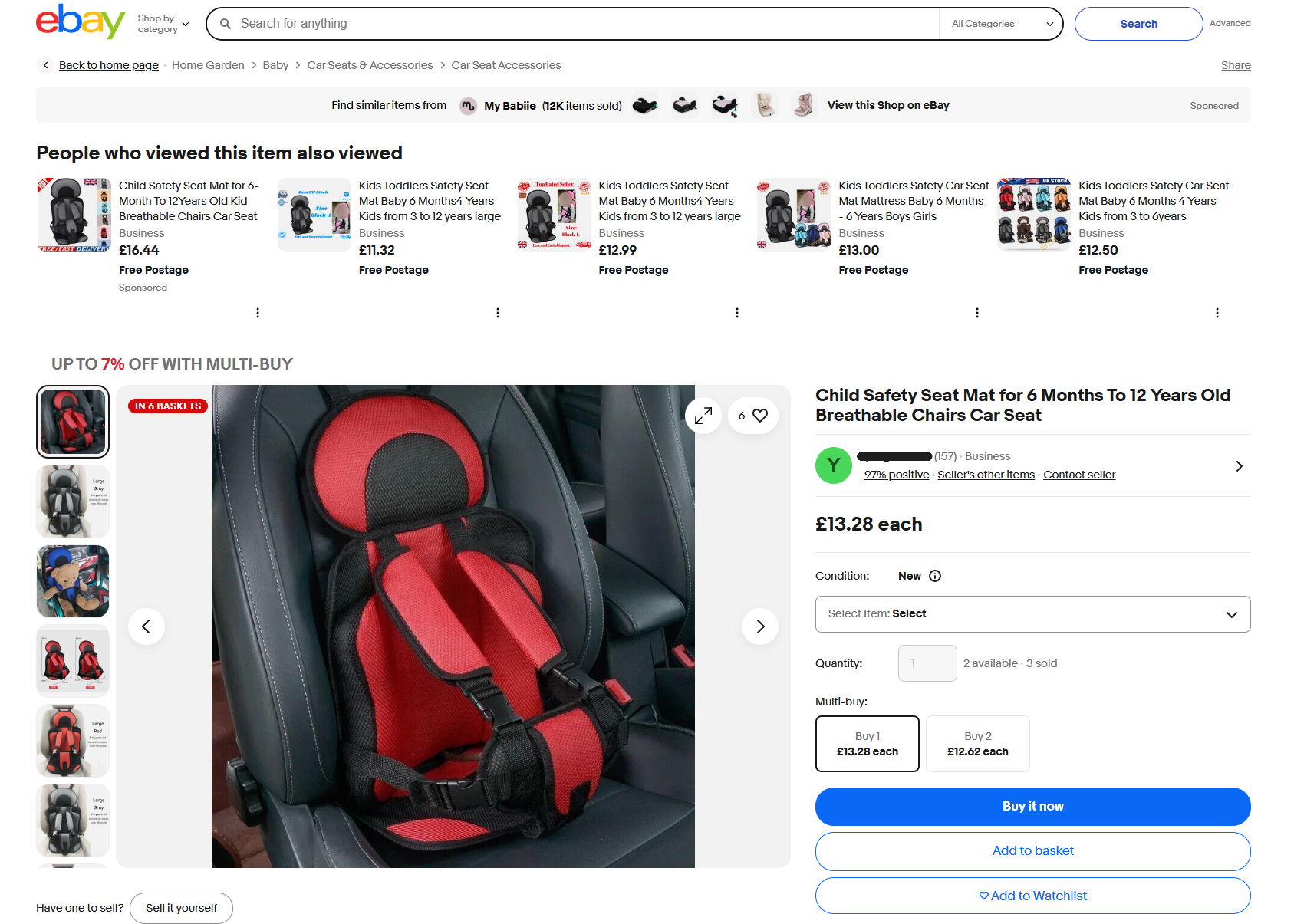‘Killer car seats’ still sold online 10 years after they were first identified, Which? finds
The consumer champion first exposed the sale of flimsy fabric children’s car seats in 2014. These were taken down at the time, but Which? recently found over a dozen new examples of these items on several well-known online marketplaces. Police have also warned that they found similar seats in vehicles at car seat checking events.
Car seats can be expensive, and Which? is concerned that families struggling with the cost of living could be tempted by these cheap but dangerous knock-offs. The consumer champion’s research found prices ranging from £12.50 to just under £40 - far below the standard price of children’s car seats, which start from around £80.
Buckinghamshire and Surrey Trading Standards has previously dubbed these products ‘killer car seats’ - and with good reason. When car seat manufacturer Britax used one to show the effect of a 30mph impact, the test dummy, which represented a three-year-old child, was hurled through the windscreen when the seat straps came loose.
The safety defects in these ‘killer car seats’ include a thin seat base and not having one central point of release for the harness. These are fundamental flaws since car seats must raise a child’s height to position the seat belt correctly across their lap, and multiple buckles on the harness can make it difficult to rescue a child in the event of a crash.
A disturbing feature of these products is their clear lack of side impact protection, which is needed to protect a child’s head from hitting the inside of the car. This omission is a fundamental safety failing that leaves children vulnerable to head trauma or death in the event of a side impact.
The seats Which? found also lack the distinctive orange labels that indicate which safety regulation the seats comply with. Child car seats must have an R44 or R129 regulation label to be sold legally in the UK.
Another concern is that while eBay’s product listings describe these items as car seats, the full descriptions warn against using them in cars. Which? also felt that the warning against using these seats in a car is poorly worded and likely to confuse shoppers further. It reads: “Note: it is best not to use it on high-speed cars. We recommend that it be used in non-motorized products such as electric vehicles, two-wheelers, and electric vehicles. Because it is not a child safety seat that complies with traffic.”
Which? campaigned for new product safety laws, which received Royal Assent this year. Following this crucial first step, Which? is calling for secondary regulations to impose a clear and robust duty on online marketplaces to prevent the sale of unsafe products - backed up by strong penalties and rigorous enforcement.
The consumer champion’s investigations have shown time and again that online marketplaces need to be given clear responsibilities for ensuring the safety of products that they list on their sites. Without tough secondary regulations, Which? believes online marketplaces will continue to put lives at risk by failing to prevent the sale of unsafe and illegal products.
Regulators such as the Office for Product Safety and Standards and Trading Standards must also be given strong enforcement powers that force online marketplaces to take product safety seriously.
Sue Davies, Which? Head of Consumer Protection Policy, said:
“It is appalling that these deadly car seats are reappearing on online marketplaces more than a decade after Which? first exposed them, but it is not surprising. This is just one in a long list of dangerous products that Which? has identified and have been taken down only for them to later reappear for sale.
“Children’s lives will be at risk, with less affluent households most likely to be affected, until online marketplaces are forced to take responsibility for the listing of these cheap but deadly car seats.
“The Product Regulation and Metrology Act is a welcome start for strengthening product safety laws, but secondary regulations are needed to impose clear legal responsibilities on online marketplaces, with tough enforcement for those that fall short.”
PC Rachael Wonfor from Warwickshire Police said:
“As a recently accredited child car seat check officer, I was shocked to find at a checking event I hosted in Rugby, a high number of fitting errors and inappropriate seats for children’s sizes.
“However, I was not prepared for the frightening contraptions fitted in one vehicle I checked. They were a harness type system intended to replace a child car seat to save space. The parent was of the understanding that these were perfectly legal as they could purchase them online.
“Ultimately, these harnesses were not only illegal but would offer a child no protection in the event of a crash. I was able to educate this parent and ensure their children travelled safely by advising them of this dangerous product.
“This leaves me wondering, how many other versions of this product are being sold and used daily with precious children’s lives relying on them?”
Janis James, Chief Executive of Good Egg Safety says:
"We are deeply concerned about the rise in illegal child car seats being sold online - seats that do not meet the required R129 or R44 safety standards.
"These products are promoted with glowing reviews, but they are nothing short of death traps.
"This is a real and present danger. We urge everyone to buy only from reputable high street retailers and always look for the orange approval label.
"No bargain is worth the life of a child. Please check before you buy."
Notes to Editors
Link to safety testing video here
For more tips on buying a child car seat that's safe and durable, read our guide on how to buy the right child car seat.
Which?’s tests are based on the R129 regulation and the most recent crash test scenarios from Euro NCAP, the organisation that carries out crash testing on cars to show how well they protect occupants in severe accidents.
Buckinghamshire and Surrey Trading Standards were previously ‘Surrey Trading Standards’ when these items were first identified in 2014.
The new product safety laws Which? campaigned for belong to the Product Regulation and Metrology Act, which received Royal Assent this year.
Parents who need to buy a baby or child car seat should always follow these guidelines:
Check that the car seat has a label with either ECE R44-03, ECE R44-04 or ECE R129, which shows that it is legal to be sold on the UK market.
Buy car seats from a retailer who can provide advice and help fit the car seat.
Never buy a second-hand car seat, since it is impossible to tell whether it has been in any crashes just by looking at it. There could be internal damage, which could compromise the structural safety and isn't obvious from the outside.
Car seats should come with instructions that are written in clear English.
If a car seat seems extremely cheap, the price is probably too good to be true.
Right of replies
An eBay spokesperson said:
‘Consumer safety is a top priority for eBay. We work diligently to prevent prohibited listings through seller compliance audits, block filter algorithms for unsafe items, and AI supported monitoring by in-house specialists, who work closely with regulators and Trading Standards. We swiftly removed these listings and notified buyers, and we continue to strengthen our preventative measures.
A spokesperson for Shein said:
'SHEIN takes product safety very seriously and is committed to offering safe and reliable products to its customers. In this case, the product had been mislabelled by the third-party seller.
'Upon being notified, SHEIN immediately removed it from the site. SHEIN vendors are required to comply with SHEIN’s code of conduct and stringent safety standards and must also abide by the relevant laws and regulations of the markets where we operate.
'SHEIN has taken action against the seller of the product according to the penalties set out in our guidelines.'
Little Dreams:
Little Dreams did not provide a comment, but Which? understands that Little Dreams is committed to providing customers with high-quality, safe, and legally compliant products. Little Dreams told Which? they would review the product in question, remove the listing from their website, and conduct a thorough internal investigation to understand how this occurred.
Wish.com
Wish.com did not respond.
ManoMano
ManoMano did not respond.
Screenshots



About Which?
Which? is the UK’s consumer champion, here to make life simpler, fairer and safer for everyone. Our research gets to the heart of consumer issues, our advice is impartial, and our rigorous product tests lead to expert recommendations. We’re the independent consumer voice that influences politicians and lawmakers, investigates, holds businesses to account and makes change happen. As an organisation we’re not for profit and all for making consumers more powerful.
The information in this press release is for editorial use by journalists and media outlets only. Any business seeking to reproduce information in this release should contact the Which? Endorsement Scheme team at endorsementscheme@which.co.uk
